Essay On Reality (Structure/Outline)
- Introduction
- Related Concepts about Reality
- Theories related to Realitys
- Types of Reality
- Western and Non- Western Philosophy
- Reality in Physical Sciences
- Reality in Social Sciences
- Realism in Technology (Virtual reality)
- The Importance of Understanding Reality
- FAQs
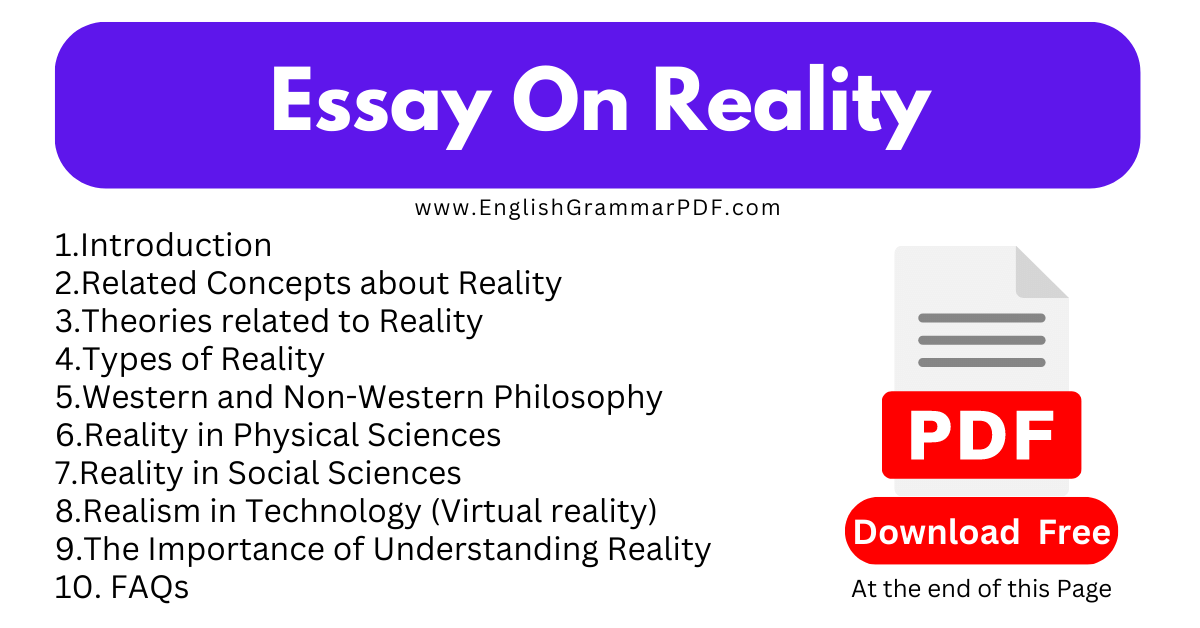
Introduction
Reality is defined as the totality of all existing things, or the state of being actual or true. It is often difficult to determine what is “real” or “true” in our world today, because truth can be subjective and facts can sometimes change depending on the situation. Nonetheless, reality holds an undeniable significance in our lives; it provides an objective foundation for some of our deepest beliefs and helps us make sense of otherwise chaotic events. By understanding reality and its importance we can better shape our environment with awareness and compassion.
Reality is an often-debated concept, with many different interpretations and understandings. It has been studied by various philosophers, scientists, and theologians throughout the centuries.
Related Concepts About Reality
The concept of reality is associated with many other ideas that are important to understanding it. These include truth, existence, knowledge, perception, materialism, and physicalism.
(1) Truth
Truth is the agreement between what we believe and what is actually true. Our beliefs can be influenced by our experiences, culture, or upbringing.
(2) Existence
Existence refers to something that is actual or real in the world; it may refer to both abstract and concrete things.
(3) Knowledge
Knowledge is the intellectual understanding of a certain topic or field.
(4) Perception
Perception is the ability to interpret sensory information and gain an understanding of our environment.
(5) Materialism
Materialism refers to the belief that matter is the only real thing.
(6) Physicalism
Physicalism suggests that reality can only be described by physical laws.
Theories Related To Reality
There are various theories related to reality, including solipsism, idealism, realism, and nihilism.
(1) Solipsism
Solipsism is the belief that reality exists only in one’s own mind. Idealism suggests that the world is composed of mental or spiritual substances.
(2) Realism
Realism holds that the material world is real and external to us.
(3)Nihilism
Nihilism believes in nothing and denies any objective truth or morality.
Types Of Reality
Reality can be divided into two main categories: subjective and objective.
(1) Subjective Reality
Subjective reality refers to the internal, individual experience of the world. It is based on personal opinions and beliefs that may differ from person to person.
(2) Objective Reality
Objective reality is an external, shared reality that exists independently of individual experience. It is based on facts and evidence that can be agreed upon by everyone.
Western and Non-Western Philosophy
Western philosophy
Western philosophy, which originated in Ancient Greece, typically focuses on the physical and material world. It places a great emphasis on reason and logic to answer questions about existence and what it means to be human.
Western philosophy holds that reality is created through knowledge, as well as humans’ experience and understanding of the world. Such knowledge can be rational or empirical, so philosophers throughout history have differed in their opinions on how best to interpret and understand the world we live in.
Plato argued that there were more than just our physical senses to consider when constructing a framework for reality – metaphysical information found outside the physical world must also play a part. Aristotle then approached reality from the point of view of sense perception, which ultimately evolved into empiricism as evidence became more widely accepted in philosophical discourse.
The idea of dualism was advanced by Descartes – suggesting that reality has both a mental and physical side that are distinct but can interact – while Kant proposed that reason itself was primarily responsible for order in nature. Ultimately, these assertions from different great thinkers have helped shape large parts of Western thought on our understanding of reality.
Non-Western philosophy
Non-Western philosophy focuses on the spiritual and metaphysical aspects of reality. It is often based on intuition, tradition, or religious beliefs.
Non-western philosophy has long helped to shape our contemporary understanding of reality, particularly in Asian countries. Traditions such as Taoism, Buddhism, and Confucianism have had a significant impact on our current knowledge base by emphasizing important concepts like interconnectedness and acceptance of change. In addition to these key principles, many non-western philosophical systems center around an understanding of the world as an organic unity composed of diverse yet interdependent parts. This focus on the interrelatedness between inner wisdom and external phenomena can give us invaluable insights about how to approach reality with a sense of peace and purpose. By considering philosophical contributions from both Western and non-Western traditions, we can gain convenient access to a variety of perspectives on life, enabling us to foster meaningful relationships with ourselves and others that consider the deeper rooted diversity of humanity.
Reality in Physical Sciences
The physical sciences, such as physics and chemistry, study the physical nature of reality. They seek to understand how matter interacts with other substances in order to explain the laws of nature. This scientific approach to reality has been largely successful in understanding the physical world and producing tangible results like technological advancements. Understanding the different principles of each one opens a door to an understanding of how our universe works.
To many, delving into this area is a fascinating journey that leads to unique insights and understandings into the way things work around us–insights that may never be fully realized but can nevertheless spark considerable curiosity and enthusiasm. By learning more about the reality of physical sciences, we gain a glimpse at life from a perspective outside ourselves that can help us find fresh ways approaching it.
Reality in Social Sciences
The social sciences, such as psychology and sociology, study the human experience of reality. They examine how individuals interact with each other in order to understand group behavior, values, beliefs, and social norms. This line of thought seeks to explain how our understanding of reality is shaped by culture, language, and other factors. By studying the way people think, feel, and behave in different contexts we can better understand our own reality and that of others. This knowledge can then be used to foster better relationships and create a more cohesive society.
Realism in Technology ( Virtual Reality)
In the realm of technology, virtual reality (VR) is increasingly being used as a means to explore reality. VR allows users to immerse themselves in a simulated environment, either realistic or fantastical. This technology has allowed us to experience realities that would otherwise be impossible—such as living on other planets or exploring different points of view. It has also proven useful in providing therapeutic relief for those suffering from mental illness, as well as helping to explore the nature of consciousness.
Virtual reality can provide us with an opportunity to understand our own reality while being able to experiment within a simulated one—an invaluable tool that has the potential to significantly shape our understanding of reality.
The Importance of Understanding Reality
The importance of understanding reality, both physical and social, cannot be overstated. It is a fundamental part of our learning process as it allows us to gain new insights and develop more meaningful relationships. By exploring different aspects of reality, we can gain a better understanding of ourselves and the world around us. This knowledge can then be used to foster better relationships, create a more cohesive society, and produce tangible results such as technological advancements. Ultimately, understanding reality is an essential part of living meaningful lives and should be embraced.
The journey to understanding reality may never end, but it remains one of the most rewarding activities we can undertake in life. Understanding reality not only helps us learn more about who we are and our place in the world, but also gives us a greater appreciation of the countless perspectives on life that exist. Whether it’s through physical sciences, social sciences, technology or philosophy—exploring reality is sure to provide an invaluable experience.
FAQs
What is reality in psychology?
Reality in psychology refers to how individuals perceive and interact with the world around them. This includes their beliefs, values, ideas, and behaviors. It is based on both individual interpretation as well as societal influences.
What is nature of reality?
The nature of reality is the concept that all things exist in an objective, physical world, and can be explained through scientific methods. It is believed to be knowable and understandable, although it may not always be completely accessible to us.
What is virtual reality?
Virtual reality (VR) is a simulated environment experienced by users through a headset or other device. It allows users to immerse themselves in a realistic or fantastical world, and provides an opportunity to explore different realities without the dangers of entering into the physical one.
What are the five features of reality?
The five features of reality are change, uncertainty, contingency, relativism, and complexity.
What are the basic realities?
The basic realities are space, time, energy, matter, and consciousness. These five elements form the basis of all reality and are interrelated in a variety of ways.
Essay On Reality (Pictures & PDF)
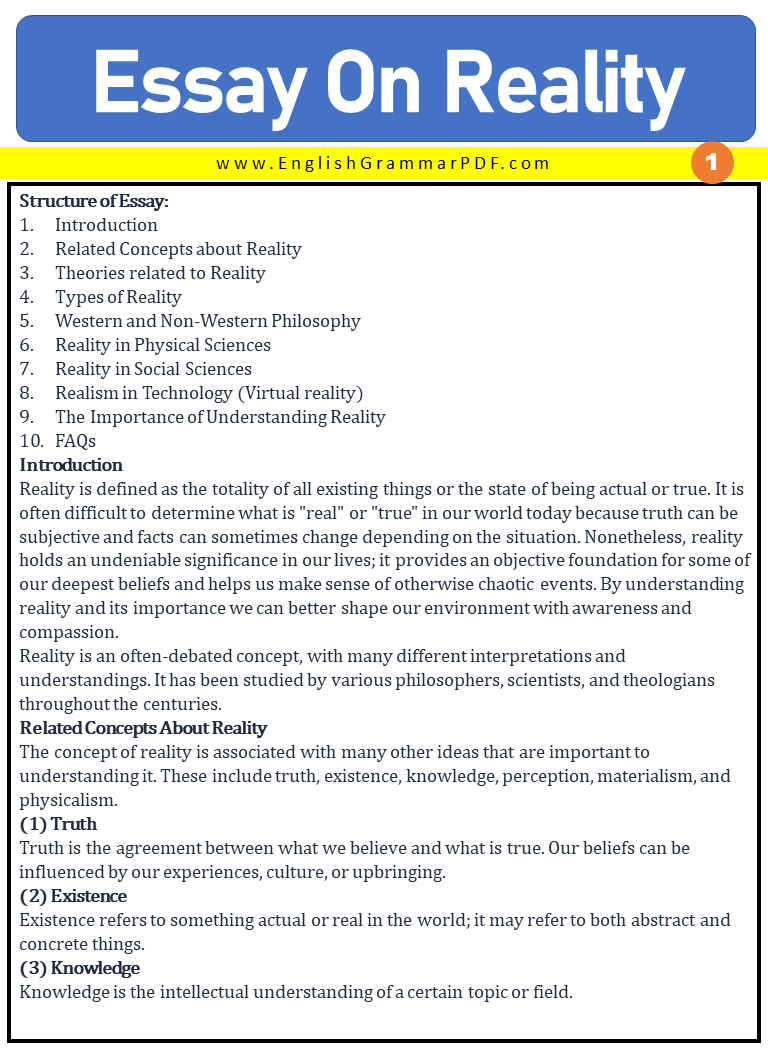
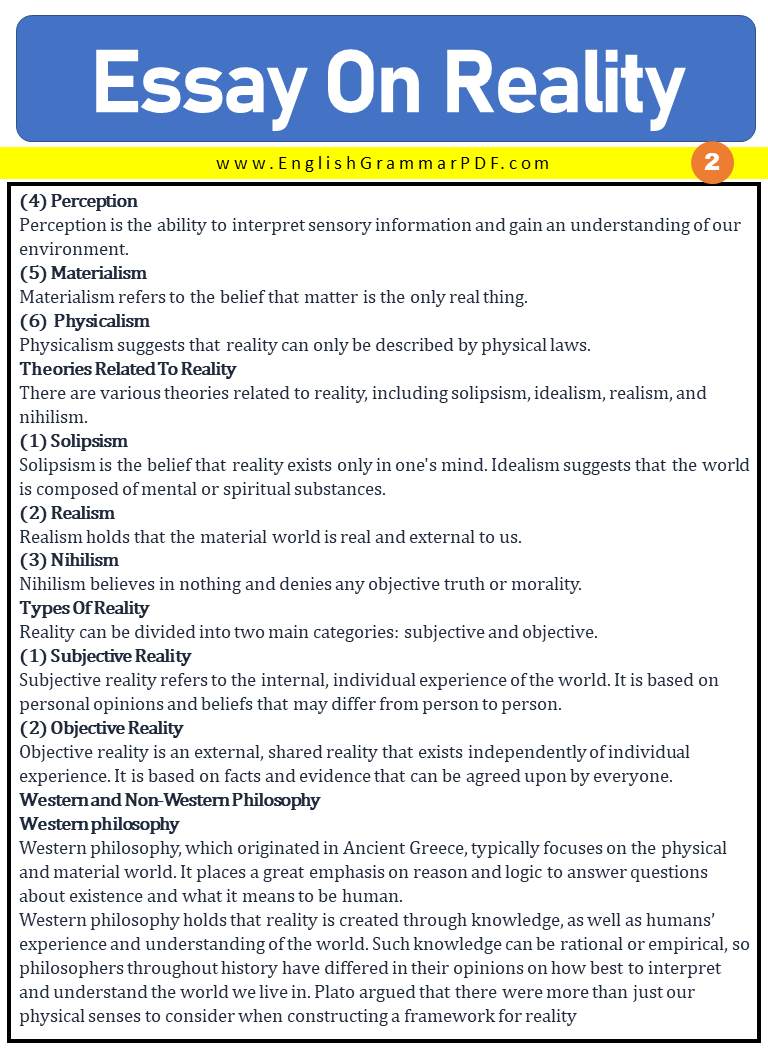
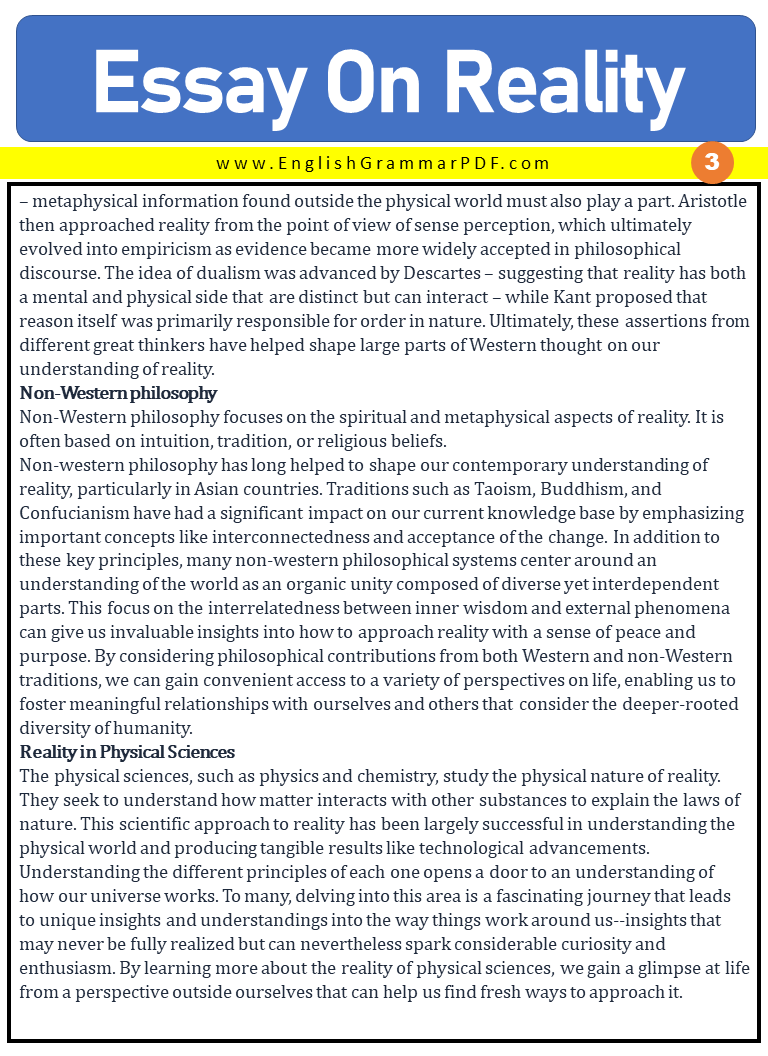
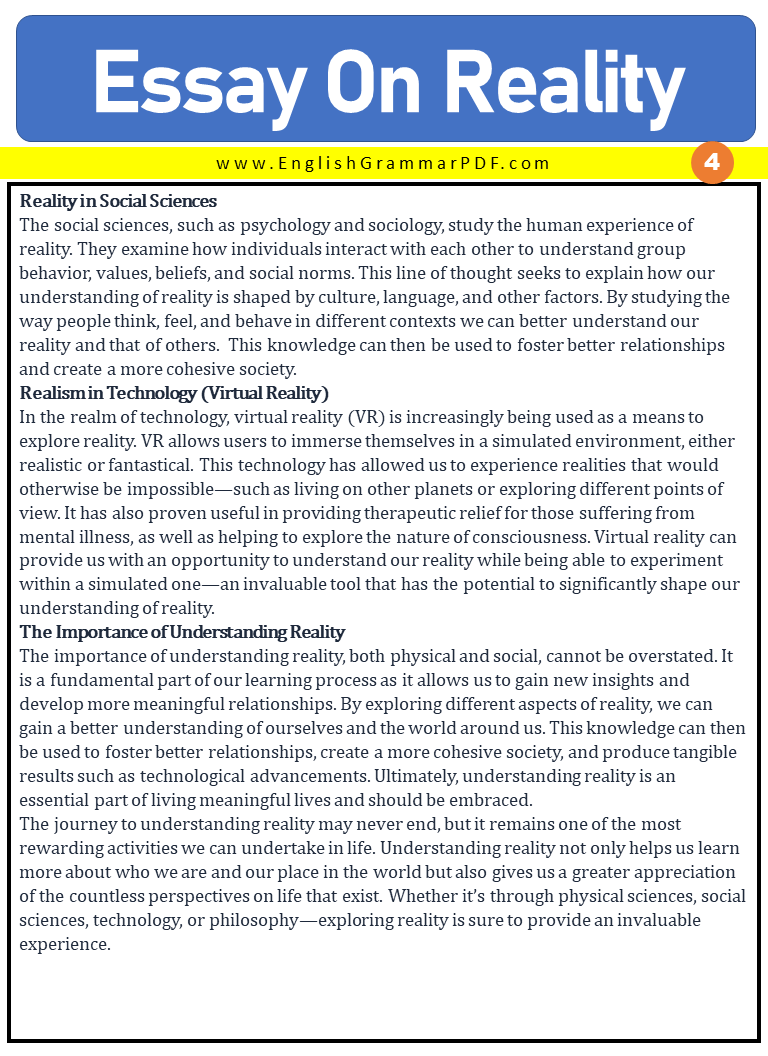
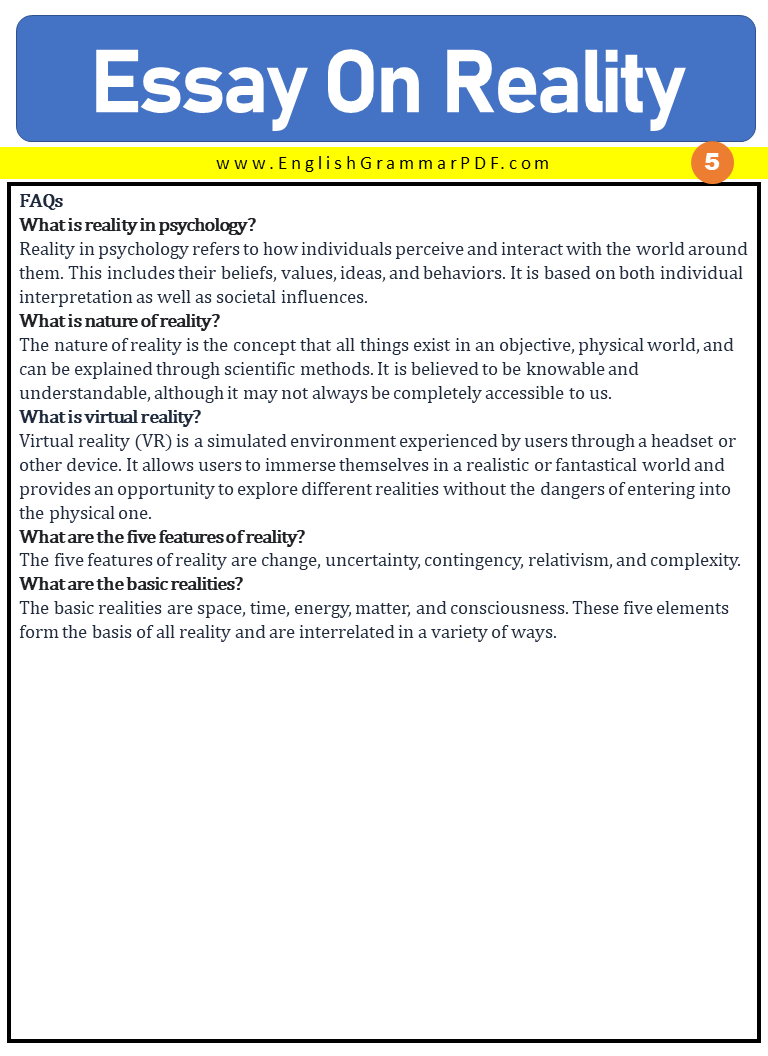
Below is the PDF of this Essay.


